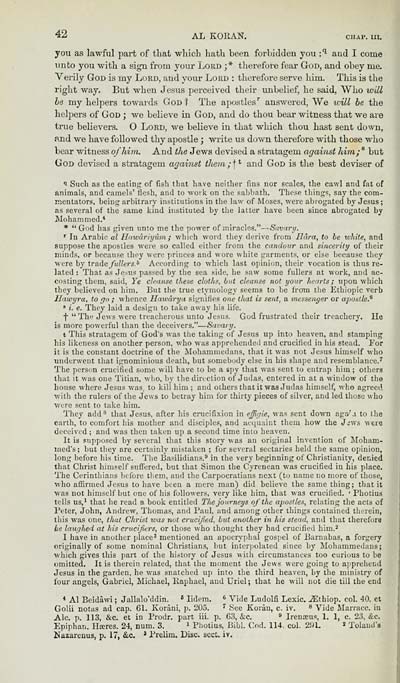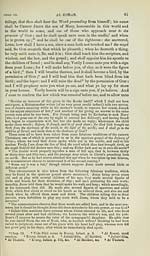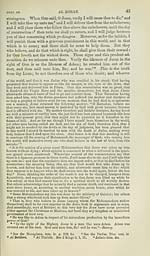Download files
Complete book:
Individual page:
Thumbnail gallery: Grid view | List view

42 AL KORAN. CHAP. la.
you as lawful pai-t of tliat which hath been forlndden you •.'^ and I come
iinfco you with a sign from your Lord ;* therefore fear God, and obey me.
Verily God is my Lord, and your Lord ; therefore serve him. This is the
right way. But when Jesus perceived tlieir unbelief, he said, Who will
be my helpers towards GoD 1 The apostles'" answered, We will be the
he]i)ers of GoD ; we believe in God, and do thou bear witness that we are
true believers. O Lord, we believe in that which thou hast sent down,
and we have followed thy apostle ; wi-ite us down therefore with those who
bear witness of him. And the Jews devised a stratagem against him; ^ but
God devised a stratagem against tliem;\^ and God is the best deviser of
I Such as the eatinfr of fish that have neither fins nor scales, the cawl and fat of
animals, and camels' flesh, and to work on the sahliath. These things, say the com-
mentators, being arbitrary institutions in the law of Moses, were abrogated by Jesus ;
as several of the same kind instituted by the latter have been since abrogated by
ftlohammcd.*
* " God has given unto me the power of miracles." — Suvary.
' In Arabic al Huwdriymn ; which word they derive from Ilctra, to be white, and
suppose the apostles were so called either from the candour and sincerity of their
minds, or because they were princes and wore white garments, or else because they
were by trade fullers.^ According to which last opinion, their vocation is thus re-
lated : That as Jesus passed by the sea side, he saw some fullers at work, and ac-
costing them, said. Ye cleanse these cloths, but cleanse not your hearts; upon which
they believed on him. But the true ctyitiology seems to be frorm the Ethiopic verb
Hawyra, to r/n ; whence ILnn'iry^t si-iiilics one that is sent, a messenger or apostle.^
' i. e. They laid a dL'si-u tu take auav his life.
t " Th'> Jews were tivachemus unto Jesus, God frustrated their treachery. lie
is more powerful than the deeeivers."— .S-j/yia?/.
t This stratagem of God's was the taking- of Jesus up into heaven, and stamping
his likeness on another person, who was a])]irehende(l and crucified in his stead. For
it is the constant doctrine of the JMohaiiiiuedans, that it was not Jesus himself who
underwent that ignominious death, but somebody else in his shape and resemblance.^
The person crucified some will have to be a spy that was sent to entrap him ; others
that it was one Titian, who, by the direction of Judas, entered in at a window of the
house where Jesus was, to kill him ; and others that it was Judas himself, who agreed
with the rulers of the Jews to betray him for thirty pieces of silver, and led those who
were sent to take him.
They add^ that Jesus, after his crucifixion in effi;jie, was sent down aga'.i to the
earth, to comfort his mother and disciples, and uequaint them how the Jiws were
deceived ; and was then taken up a second time into heaven.
It is supposed by several that this story was an original invention of Moham-
med's; but they are certainly mistaken ; for several sectaries held the same opinion,
long before his time. The Basilidians.' in the very beginning of Christianity, denied
that Christ himself suffered, but that Simon the Cyrcnean was crucified in his place.
The Cerintliians before them, and the Carpocratians next (to name no more of those,
who affirmed Jesus to have been a mere man) did believe the same thing; that it
was not himself but one of his followers, very like him, that was crucified. • Photius
tells us,^ that he read a book entitled The journeys of the apostles, relating the acts of
Peter, John, Andrew, Thomas, and Paul, and among other things contained therein,
this was one, that Christ teas not crucified, but another in his stead, and that thereforo
he laughed at his crucifi*irs, or those who thought they had crucified him.*
I have in another place' mentioned an apocryphal gospel of Barnabas, a forgery
originally of some nominal Christians, but interpolated since by Mohammedans;
which gives this part of the history of Jesus with circumstances too curious to be
omitted. It is therein related, th.it the moment the Jews were going to ai)prehend
Jesus in the garden, he was snatched up into the third heaven, by the ministry of
four angels, Gabriel, Michael, Kaphael, and Uriel; that he will not die till the end
* Al Beidawi ; Jallalo'ddin. * lidera. ' Vide Ludolfi Lexic. ^thiop. col. 40. et
Golii notas ad cap. 61. Korani, p. 205. ^ See Koran, c. iv. ^ Vide Marracc. in
Ale. p. 113, &c. et in Prodr. part iii. p. G3, &c. » Irenceus, 1. 1, c. 23, &c.
Epiphan. H.-eres. 24, num. 3. ^ Photius, Bibl. Cod. 114. col. 21^1. » Toland's
Kazarenus, p. 17, &c. * Prelim. Disc. sect. iv.
you as lawful pai-t of tliat which hath been forlndden you •.'^ and I come
iinfco you with a sign from your Lord ;* therefore fear God, and obey me.
Verily God is my Lord, and your Lord ; therefore serve him. This is the
right way. But when Jesus perceived tlieir unbelief, he said, Who will
be my helpers towards GoD 1 The apostles'" answered, We will be the
he]i)ers of GoD ; we believe in God, and do thou bear witness that we are
true believers. O Lord, we believe in that which thou hast sent down,
and we have followed thy apostle ; wi-ite us down therefore with those who
bear witness of him. And the Jews devised a stratagem against him; ^ but
God devised a stratagem against tliem;\^ and God is the best deviser of
I Such as the eatinfr of fish that have neither fins nor scales, the cawl and fat of
animals, and camels' flesh, and to work on the sahliath. These things, say the com-
mentators, being arbitrary institutions in the law of Moses, were abrogated by Jesus ;
as several of the same kind instituted by the latter have been since abrogated by
ftlohammcd.*
* " God has given unto me the power of miracles." — Suvary.
' In Arabic al Huwdriymn ; which word they derive from Ilctra, to be white, and
suppose the apostles were so called either from the candour and sincerity of their
minds, or because they were princes and wore white garments, or else because they
were by trade fullers.^ According to which last opinion, their vocation is thus re-
lated : That as Jesus passed by the sea side, he saw some fullers at work, and ac-
costing them, said. Ye cleanse these cloths, but cleanse not your hearts; upon which
they believed on him. But the true ctyitiology seems to be frorm the Ethiopic verb
Hawyra, to r/n ; whence ILnn'iry^t si-iiilics one that is sent, a messenger or apostle.^
' i. e. They laid a dL'si-u tu take auav his life.
t " Th'> Jews were tivachemus unto Jesus, God frustrated their treachery. lie
is more powerful than the deeeivers."— .S-j/yia?/.
t This stratagem of God's was the taking- of Jesus up into heaven, and stamping
his likeness on another person, who was a])]irehende(l and crucified in his stead. For
it is the constant doctrine of the JMohaiiiiuedans, that it was not Jesus himself who
underwent that ignominious death, but somebody else in his shape and resemblance.^
The person crucified some will have to be a spy that was sent to entrap him ; others
that it was one Titian, who, by the direction of Judas, entered in at a window of the
house where Jesus was, to kill him ; and others that it was Judas himself, who agreed
with the rulers of the Jews to betray him for thirty pieces of silver, and led those who
were sent to take him.
They add^ that Jesus, after his crucifixion in effi;jie, was sent down aga'.i to the
earth, to comfort his mother and disciples, and uequaint them how the Jiws were
deceived ; and was then taken up a second time into heaven.
It is supposed by several that this story was an original invention of Moham-
med's; but they are certainly mistaken ; for several sectaries held the same opinion,
long before his time. The Basilidians.' in the very beginning of Christianity, denied
that Christ himself suffered, but that Simon the Cyrcnean was crucified in his place.
The Cerintliians before them, and the Carpocratians next (to name no more of those,
who affirmed Jesus to have been a mere man) did believe the same thing; that it
was not himself but one of his followers, very like him, that was crucified. • Photius
tells us,^ that he read a book entitled The journeys of the apostles, relating the acts of
Peter, John, Andrew, Thomas, and Paul, and among other things contained therein,
this was one, that Christ teas not crucified, but another in his stead, and that thereforo
he laughed at his crucifi*irs, or those who thought they had crucified him.*
I have in another place' mentioned an apocryphal gospel of Barnabas, a forgery
originally of some nominal Christians, but interpolated since by Mohammedans;
which gives this part of the history of Jesus with circumstances too curious to be
omitted. It is therein related, th.it the moment the Jews were going to ai)prehend
Jesus in the garden, he was snatched up into the third heaven, by the ministry of
four angels, Gabriel, Michael, Kaphael, and Uriel; that he will not die till the end
* Al Beidawi ; Jallalo'ddin. * lidera. ' Vide Ludolfi Lexic. ^thiop. col. 40. et
Golii notas ad cap. 61. Korani, p. 205. ^ See Koran, c. iv. ^ Vide Marracc. in
Ale. p. 113, &c. et in Prodr. part iii. p. G3, &c. » Irenceus, 1. 1, c. 23, &c.
Epiphan. H.-eres. 24, num. 3. ^ Photius, Bibl. Cod. 114. col. 21^1. » Toland's
Kazarenus, p. 17, &c. * Prelim. Disc. sect. iv.
Set display mode to: Large image | Transcription
Images and transcriptions on this page, including medium image downloads, may be used under the Creative Commons Attribution 4.0 International Licence unless otherwise stated. ![]()
| Early Gaelic Book Collections > J. F. Campbell Collection > Koran: or, Alcoran of Mohammed > (196) |
|---|
| Permanent URL | https://digital.nls.uk/77136251 |
|---|
| Description | Volumes from a collection of 610 books rich in Highland folklore, Ossianic literature and other Celtic subjects. Many of the books annotated by John Francis Campbell of Islay, who assembled the collection. |
|---|
| Description | Selected items from five 'Special and Named Printed Collections'. Includes books in Gaelic and other Celtic languages, works about the Gaels, their languages, literature, culture and history. |
|---|

